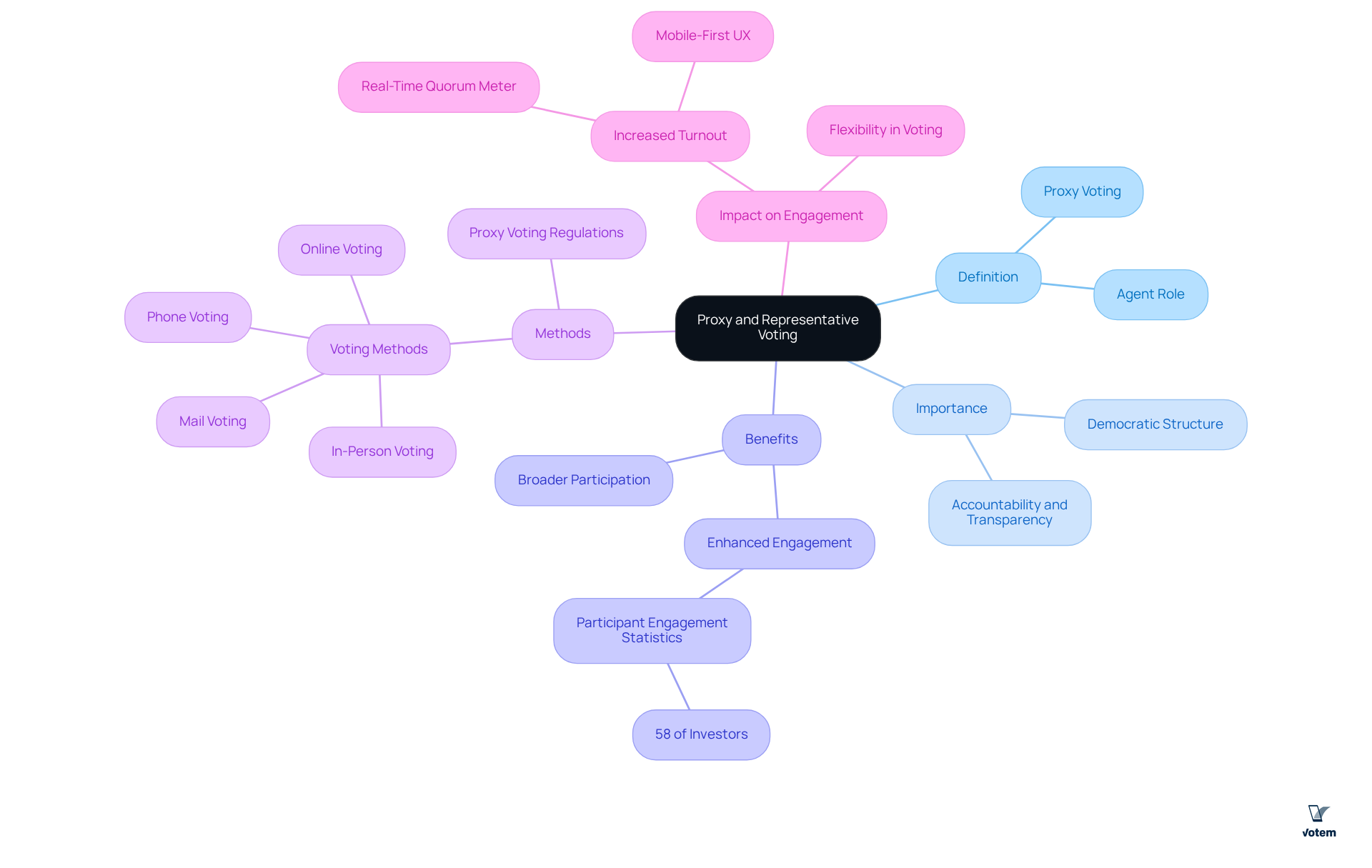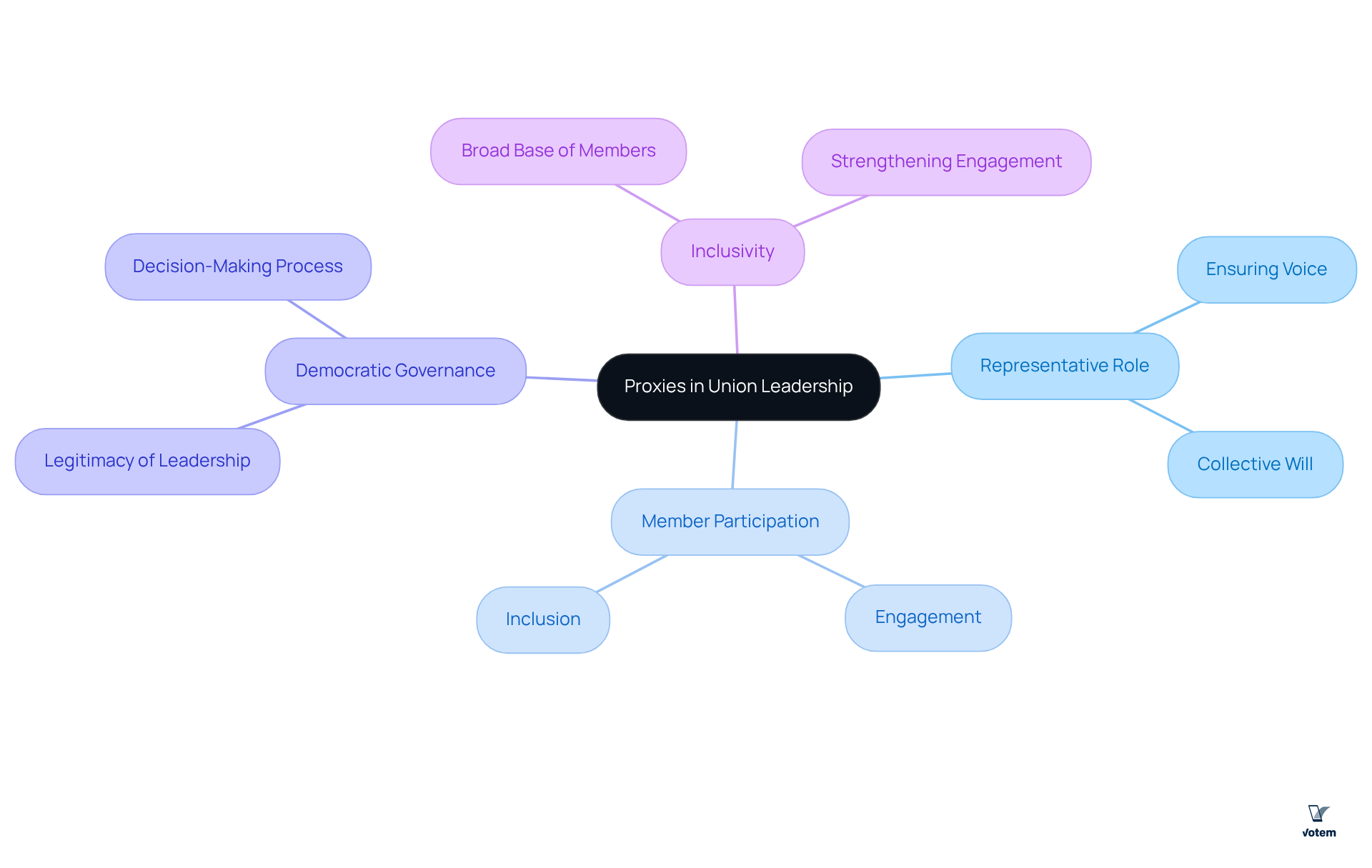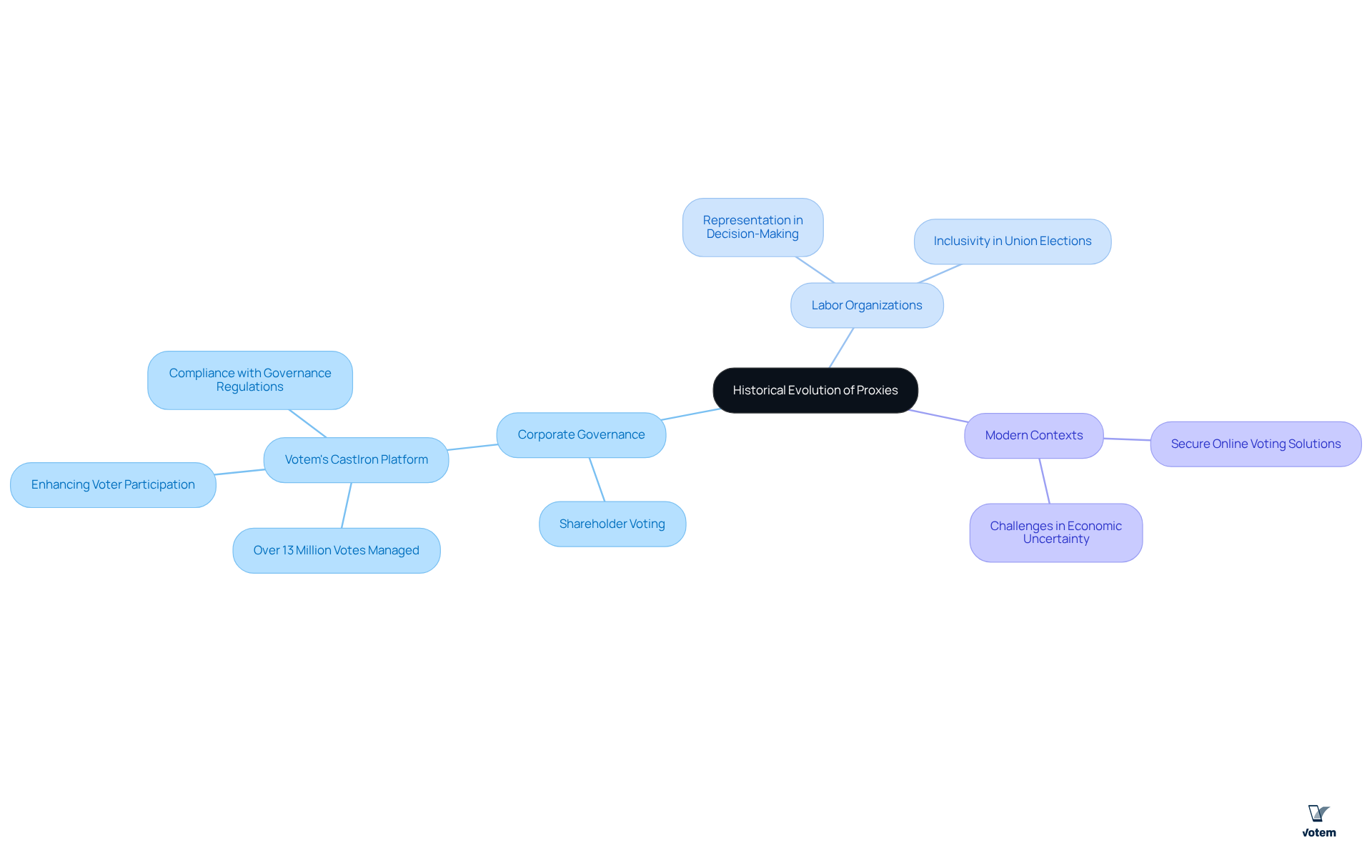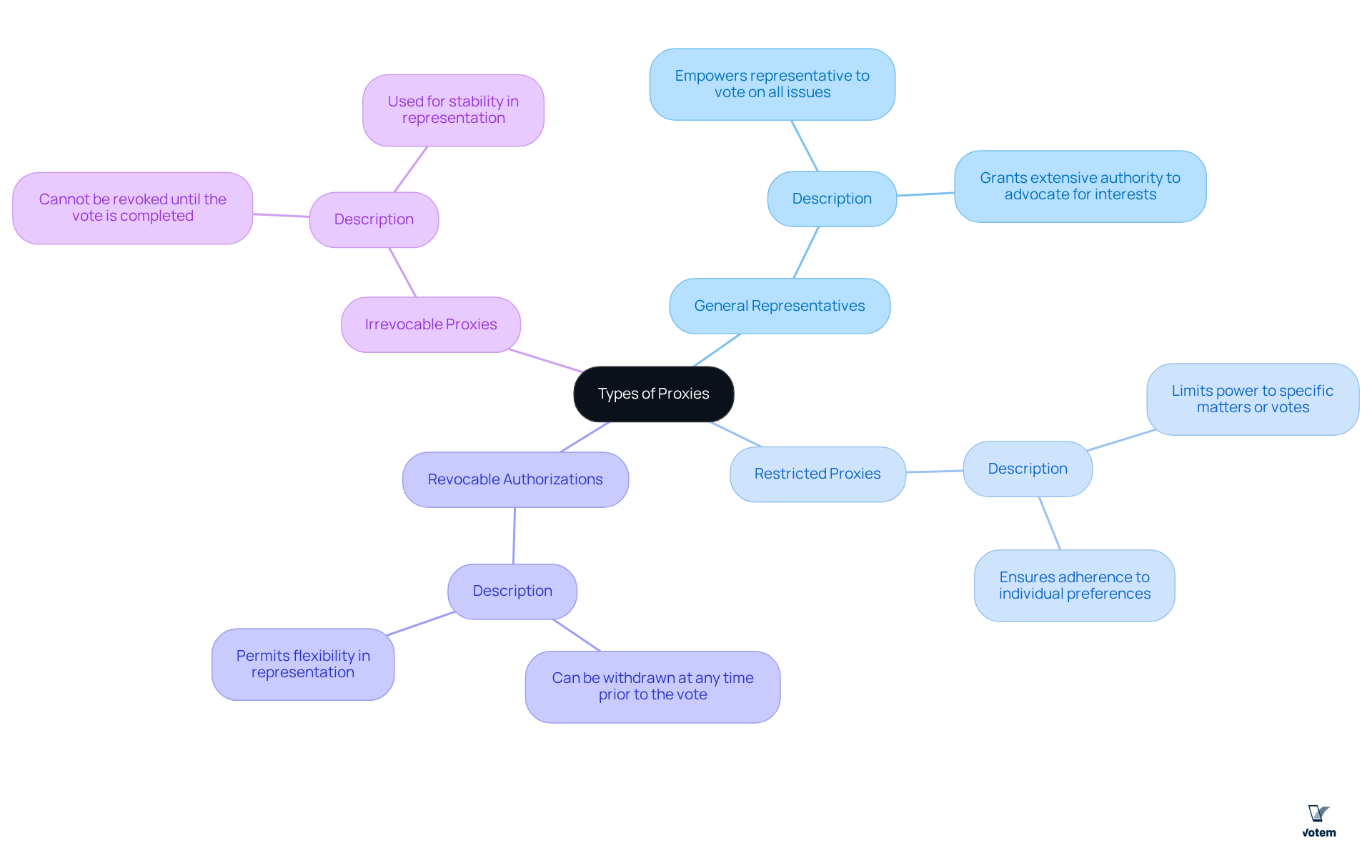Overview
The article defines a proxy as an individual authorized to act on behalf of another, particularly in contexts such as elections and union governance. This role is crucial for facilitating participation in decision-making processes. By emphasizing the importance of representative balloting, the article highlights how it enhances democratic engagement and ensures that all voices are heard. Furthermore, data supports the assertion that participation increases when individuals can influence decisions through proxies. Union leadership must recognize the potential of proxies to foster greater involvement and representation among their members.
Introduction
Understanding the concept of a proxy is vital in various contexts, from corporate governance to labor unions, where representation is crucial for effective decision-making. Proxies serve a multifaceted role, enhancing democratic participation and ensuring that every voice is heard, even when individuals cannot be physically present. As organizations navigate the complexities of governance, the strategic use of proxies can transform engagement and accountability in decision-making processes. How can we harness this potential to foster a more inclusive environment?
Define Proxy: Understanding the Concept
An agent is an individual authorized to act on behalf of another, particularly in election contexts. This delegation facilitates involvement in decision-making processes, even when individuals are unable to be physically present. In labor organizations, representative balloting is vital during meetings and elections, allowing participants to articulate their perspectives and influence outcomes from a distance.
Data indicates that representative balloting can significantly enhance participant engagement; for instance, 58% of investors are more likely to invest in a fund if they can influence representative decision-making. This mechanism not only promotes broader participation but also fortifies the democratic structure of organizations.
By providing alternative voting methods, unions can ensure that all members, regardless of their ability to attend meetings, have a voice in critical decisions, thereby reinforcing the principle of representation. Experts assert that representative balloting is crucial for maintaining accountability and transparency, establishing it as a cornerstone of effective governance in democratic processes.
Furthermore, Votem’s platform allows representative votes to be cast in person, by mail, phone, or online before the deadline, thereby enhancing accessibility and participation. This flexibility is essential for empowering individuals to engage in the decision-making process, further underscoring the importance of representative voting in labor organizations.

Context of Proxies in Union Leadership
In organizational leadership, representatives play a crucial role in ensuring that all participants have a voice in governance, especially during elections or significant decision-making gatherings. Unions often comprise extensive memberships, and it is impractical for every member to attend each meeting. By allowing members to designate representatives, organizations can ensure that decisions reflect the collective will of their supporters. This practice not only enhances democratic participation but also strengthens the legitimacy of leadership by ensuring that decisions are informed by a broader base of members. Furthermore, it fosters a sense of inclusion and engagement among the membership, reinforcing the idea that every voice matters in the decision-making process.

Historical Evolution of Proxies
The historical use of proxies, or what’s a proxy, is deeply rooted in corporate governance, initially serving to facilitate shareholder voting by allowing individuals to delegate their voting rights. This practice evolved significantly within labor organizations, driven by the necessity for representation in decision-making processes. Such a transition reflects broader societal movements that promote enhanced democratic involvement and recognize participant engagement in governance. For instance, Votem’s CastIron platform has effectively overseen more than 13 million votes, greatly boosting voter participation while ensuring adherence to stringent governance regulations. This demonstrates how secure online ballot solutions can enhance involvement in collective elections.
In modern contexts, representative balloting, also known as what’s a proxy, has emerged as a crucial element of union elections, ensuring that every individual’s opinion is acknowledged, regardless of their capacity to participate in meetings. This evolution underscores the significance of in organizational decision-making, particularly in a landscape marked by economic uncertainty and political division. The necessity for effective voting practices is further emphasized, as union leadership navigates these challenges. By adopting robust electoral solutions, unions can foster greater engagement and ensure that all voices are heard in the decision-making process.

Key Characteristics and Types of Proxies
Proxies can be categorized into several types, each serving distinct purposes within organizational governance. Understanding these categories is crucial for union members to navigate the effectively and ensure their interests are adequately represented in union governance, particularly in grasping what’s a proxy. The most common types include:
- General Representatives: These proxies empower the representative to vote on all issues at the meeting, granting extensive authority to advocate for the participant’s interests.
- Restricted Proxies: These limit the representative’s power to specific matters or votes, ensuring that the individual’s preferences are closely adhered to.
- Revocable Authorizations: Members can withdraw these authorizations at any time prior to the vote, permitting flexibility in representation.
- Irrevocable Proxies: Once granted, these cannot be revoked until the vote is completed, often utilized in situations where stability in representation is essential.
By grasping these characteristics, union members can enhance their engagement in the governance process, ensuring their voices are heard and their interests are represented.

Conclusion
Understanding the role of proxies in decision-making processes is essential for fostering inclusive governance, particularly within labor organizations. Proxies empower individuals to participate in elections and meetings even when they cannot be physically present, ensuring that every voice is represented. This delegation of authority not only enhances democratic engagement but also strengthens the legitimacy of leadership by reflecting the collective will of the members.
The significance of representative balloting cannot be overstated, as it boosts participation and accountability within unions. Various types of proxies—general, restricted, revocable, and irrevocable—serve distinct purposes, catering to the diverse needs of union members. Furthermore, the historical evolution of proxies underscores their importance in adapting to societal changes that demand greater inclusivity and representation in governance.
Ultimately, the effective use of proxies is vital for enhancing engagement and ensuring that all members have a say in critical decisions. As labor organizations continue to navigate complex challenges, embracing robust electoral solutions will be crucial in empowering members and reinforcing the democratic principles that underpin their governance. Engaging with the proxy voting process not only amplifies individual voices but also fortifies the collective strength of unions in shaping their futures.
Frequently Asked Questions
What is a proxy in the context of decision-making?
A proxy is an individual authorized to act on behalf of another, particularly in election contexts, enabling involvement in decision-making processes even when individuals cannot be physically present.
How does representative balloting benefit labor organizations?
Representative balloting enhances participant engagement by allowing individuals to express their perspectives and influence outcomes from a distance, which is vital during meetings and elections.
What percentage of investors are more likely to invest in a fund if they can influence representative decision-making?
Data indicates that 58% of investors are more likely to invest in a fund if they can influence representative decision-making.
Why is representative balloting important for unions?
Representative balloting ensures that all members, regardless of their ability to attend meetings, have a voice in critical decisions, reinforcing the principle of representation.
How does representative balloting contribute to governance?
It is crucial for maintaining accountability and transparency, establishing itself as a cornerstone of effective governance in democratic processes.
What voting methods does Votem’s platform offer for representative voting?
Votem’s platform allows representative votes to be cast in person, by mail, phone, or online before the deadline, enhancing accessibility and participation.
Why is flexibility in voting methods important for individuals?
Flexibility in voting methods empowers individuals to engage in the decision-making process, highlighting the importance of representative voting in labor organizations.
List of Sources
- Define Proxy: Understanding the Concept
- Understanding Proxy Voting: How It Works and Real-Life Examples (https://investopedia.com/terms/p/proxy-vote.asp)
- Proxy Vote (https://polyas.com/election-glossary/proxy-vote)
- Proxy vote meaning: Complete guide to proxy voting (https://diligent.com/resources/blog/proxy-voting-guidelines)
- en.wikipedia.org (https://en.wikipedia.org/wiki/Proxy_voting)
- Historical Evolution of Proxies
- US labor union backs Norfolk in proxy battle with Ancora (https://reuters.com/world/us/us-labor-union-backs-norfolk-proxy-battle-with-ancora-2024-04-16)
- Unions Seek Influence in Corporate Battles (https://corpgov.law.harvard.edu/2024/06/05/unions-seek-influence-in-corporate-battles)
- House GOP Opens Probe Into Unions’ Proxy-Voting Activities (https://news.bloomberglaw.com/esg/house-gop-opens-probe-into-unions-proxy-voting-activities)

